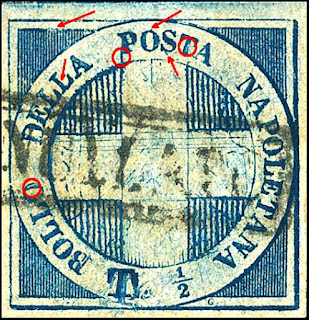These stamps are engraved on paper with forty Fleur-de-Lis watermarks in the pane (only a portion will show on each stamp)
Because the distance between the lilies is somehow large, it is possible to find parts without watermark.
The hand made paper was not uniform but varied quite a lot in thickness, from very thin and semi-transparent (not common) to very thick, almost thin cardboard
The printing in many shades of pink to carmine leaves many stamps with little visible of the engraving details.
 |
| Sc 2 |
 |
| Sc 3 |
 |
| Sc 4 |
 |
| Sc 5 |
 |
| Sc 6 |
 |
| Sc 7 |
 |
| Sc 7a |
Secret Marks
One way to tell the genuine is by the "secret marks" which spell out the engraver's initial.
HOWEVER, this is not foolproof as some like Sperati and a few sold by Fournier have them.
Cancels
Some cancels are written in a curve and with characters different from the usual ones.
They are the so called "svolazzo" ("flourish" in Italian) cancellations
There are about 40 different ones depending on the city.
Postal Forgeries (Counterfeits)
One of the most characteristic facts of Naples is the huge numbers of counterfeits of that time to cheat the postal service. This is not an exclusive characteristic; what is noticeable is the amount of samples produced.
Just for the value of the 20 grana the counterfeits are more common than the originals
The printing of these forgeries, very coarse, is very easy to detect. They have been printed in engraving using plates probably made of copper containing only one impression. This is evident from the fact that there are no multiples of these forgeries as well as there are no pieces showing parts of adjacent stamps.
2Gr
Both postal forgeries of the 2 g are lithographed, instead of engraved, they have no secret mark.
10Gr
This postal forgery of 10 g is lithographed, instead of engraved. They have no secret mark.
20Gr
This issue has by far the most postal forgeries
The above postal forgery of the 20 g is lithographed, instead of engraved. The secret mark "N" is missing.
"Reprints"
Private reprints exist of all values except 2 gr (the printing plate could not be found). They were made in 1896 and printed on thicker unwatermarked paper. These reprints were unofficial and made in Turin with the original printing plates. The colours are slightly different from the original issue.
They are too clear and the secret marks are very visible.
Oneglia Forgeries
Based on his 1879 catalog, these are probably his or inspired by him.
Sc 2 Forgeries
Fournier Forgeries
Fournier sold a vast assortment of forgeries from at least 6-8 different sources
Assorted Forgeries
Sc 1 Forgeries
 |
| Billigs Type 5 |
 |
| Billigs Type 6 |
 |
| Unknown woodblock print? |
 |
| Billigs Type 10 |
Sc 3 Forgeries
 |
| Billigs Type 12 |
 |
| Billigs Type 15 |
Sc 4 Forgeries
 |
| Billigs Type 30 |
 |
| Unlisted |
Sc 5 Forgeries
 |
| Unlisted |
 |
| Unlisted |
.jpg) |
| Billigs Type 34 |
Sc 6 Forgeries
 |
| Billigs Type 38 |
 |
| Billigs Type 39 |
 |
| Based on cancel "909" this is a Torres |
1860 Sc8 & Sc9
New tarrifs required new stamps but there was no time so the second plate of the ½g stamp was selected and the currency symbol ‘G’ was transformed with a printer’s punch into a ‘T’ for tornese. This stamp was known as the Trinacria
Once a sufficient quantity of stamps had been altered to address the urgency of the tariff reduction, the same plate continued to be modified, this time by scraping away the central part of the design, and replacing the Bourbon emblems with the Cross of Savoy. This operation was accomplished using a hand burin, and therefore one hundred unique incisions (one in each position in the plate) exist, which allows for the identification of varieties and to establish the position of each stamp within the sheet. The Cross was issued on 6 December 1860.
Sc 8 Genuine
Forgeries
Fournier Forgeries
 |
| Issued in wrong color |
Miscellaneous Forgeries
Cutout from an advertisement card from Ettore Ragozino2 forgeries with an E besides the T
3 forgeries ith a G instead of a T
Top forgery by Senf Bros.
Bottom one FACSIMILE removed and covered up with bogus cancel
2 unlisted forgeries
Sc 9 Genuine
Forgeries
Peter Winter 1980's forgeries and cover
Sperati Forgeries
Sperati forged three positions of the Cross; positions 100, 1 and 3, respectively referred to as forgery types A, B and C
Type A
This forgery only exists with "11 APR 1861" cancel always in the same position
The bottom loop of "B" in "BOLLA" has a break, the top left serif of "N" of "TANA" is broken away
There is a dot in the "D" of DELLA
There is a extension in the 2nd "N" of "TANA"
Type B
Bottom loop of "S" of "POSTA" has a stray appendage
Top left frame damaged
"P" has a line connectig to thecircle
Top of "O" in "POSTA" has a bump
"T" of "POSTA" has dots
"D" of "BOLLA" is not filled in
:L: of :BOLLA" has a dot
Type C
This is the type with the largest number of recorded copies and the greatest variety of cancels
The outer frameline at right is broken where it should meet the circular frame
The right frame is very thick
There is a dot between the "N" and "A"
The circle frame contacts the color area
Type C varietyFournier Forgeries
























































.jpg)



















No comments:
Post a Comment
THANK YOU for the feedback. Your comment will be reviewed and appear on this blog within 24 hours
Do you have any pic to share? Use this code [img]your-image-url-here[/img]